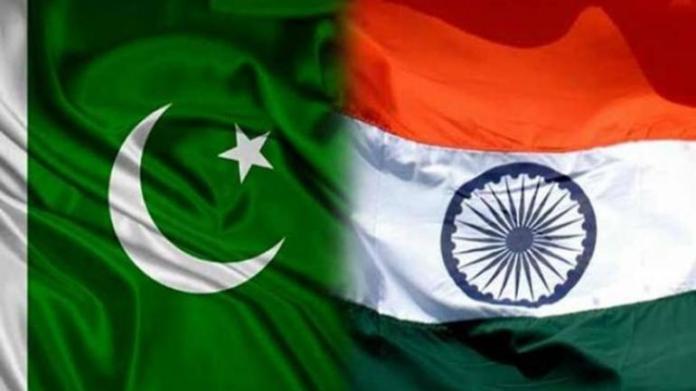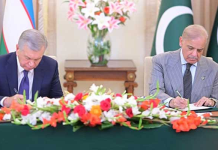ISLAMABAD, JUL 6: /DNA/ – A grand gathering of intellectuals and experts at a roundtable convened by the Institute of Regional Studies (IRS) in collaboration with the Beaconhouse National University (BNU) discussed the challenges and opportunities for engagement between Pakistan and India following recent elections in both countries.
Former Federal Minister for Information Senator Mushahid Hussain Sayed, Former Minister of Defence and Foreign Affairs Khurram Dastagir Khan, Former National Security Advisor, Gen Nasir Khan Janjua, and Former Finance Minister, Dr Salman Shah were the keynote speakers amongst a panel of 30 experts, while former Minister for Information and Climate Change and the current chairperson of Senate Committee on Climate Change Sherry Rehman spoke as the guest of honor.
Amb Jauhar Saleem, President IRS, and Amb Mansoor Ahmed Khan, Director Beaconhouse Center for Policy Research, opened the discussion by presenting an analysis of the state of Pakistan-India relations and posing a key question: what is Pakistan’s current position regarding its relations with India and what steps should be taken next? The panelists then discussed different approaches for interaction with India-provided India adopted a more receptive and responsible stance—including formal dialogues, track II initiatives, or alternative backchannel methods. They also explored the possibilities for resolving Jammu and Kashmir dispute and other issues, fostering economic ties, and promoting normalization between the two nations. Some also suggested enhancing ties with Afghanistan and fostering a more strategic approach with China. Some former top diplomats also called for seeking assistance from Russia and the US to facilitate dialogue between Pakistan and India.
Much emphasis was placed by various speakers on bolstering Pakistan’s internal socio-economic and military capabilities, as well as improving governance. The participants argued that an effective dialogue process between the two countries hinged on building an enabling environment to agree upon key areas of engagement, addressing mutual concerns such as climate and water, while upholding Pakistan’s stance on Kashmir. Regarding water negotiations, the importance of both sides honoring the Indus Waters Treaty was duly underlined.
Some participants also highlighted the need for clarity on Pakistan’s long-term foreign policy objectives. They emphasized a regional cooperative approach towards the multifaceted challenges faced by the region as a whole such as poverty, human security, and climate change.
The speakers deplored Indian unilateral actions in the disputed territory of Kashmir. They also condemned India’s use of proxies against Pakistan as well as its aggressive military posturing and spending. Some of the participants of the roundtable were of the view that while India was on the rise economically, which had resulted in a policy-level perception of looking at itself as a regional power, even an emerging global power, a good proportion of its socioeconomic challenges remained unaddressed such as income inequality, suppression of minority religious groups, and rampant poverty.
The participants of the roundtable included Amb Jauhar Saleem, President IRS; Dr. Moeed Yusuf, VC BNU; Amb Mansoor Ahmad Khan, Director BCPR at the BNU; Amb Salman Bashir, Former Foreign Secretary, and High Commissioner to India; Amb Aizaz Ahmad Chaudhry, Former Foreign Secretary; Amb. Tehmina Janjua former foreign secretary; Lt Gen Asad Durrani, Former Director General ISI; Amb Ashraf Jehangir Qazi, Former Amb to US, India and China; Amb Khalid Mehmood, Chairman BoG Institute of Strategic Studies (ISSI); Amb Aziz Ahmad Khan, Former High Commissioner of Pakistan to India; Amb Shafqat Kakakhel, Chairperson BoG SDPI and former UN Assistant Secretary General; Amb Zamir Akram, Advisor Strategic Plans Division; Amb Abdul Basit, Former High Commissioner of Pakistan to India; Mr Qasim Niaz, Former Federal Secretary Commerce; Amb Ali Sarwar Naqvi, Executive Director, Center for International Strategic Studies (CISS); Dr. Riffat Hussain, Former Dean, Professor at NUST; Amb Raza Muhammad, President Institute Policy Research Institute (IPRI); Dr. Maria Sultan, Chairperson, President South Asian Strategic Stability Institute University (SASSI); Dr. Zafar Nawaz Jaspal, Dean, Professor SPIR, QAU; Mr. Jamal Aziz, Executive Director, Research Society of International Law (RSIL); Dr. Shaheen Akhtar, HOD IR Dept, NDU; Air Commodore Khalid Banuri, Adviser Jinnah Centre for Character and Leadership AHQ; Amb Syed Zulfiqar Gardezi, Former Deputy High Commissioner to India; Amb Babar Amin, Former Deputy High Commissioner to India; and Dr Mujeeb Afzal, Associate Professor at QAU.

















